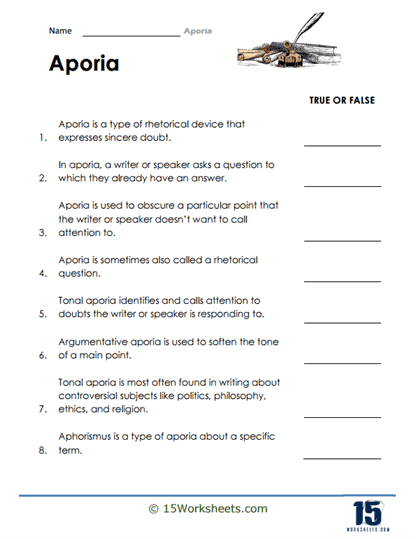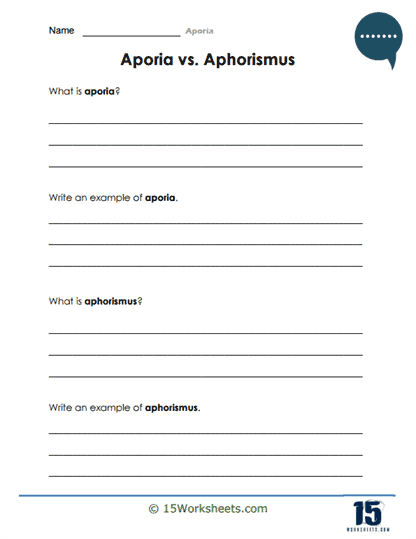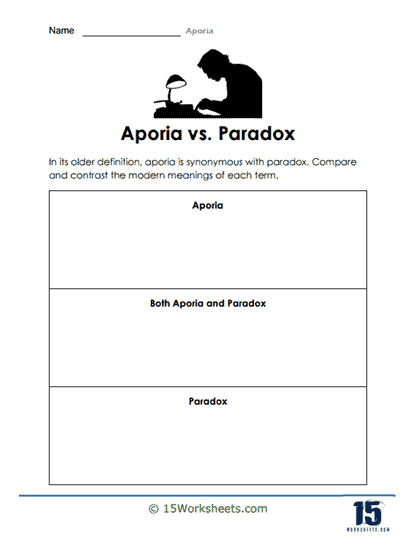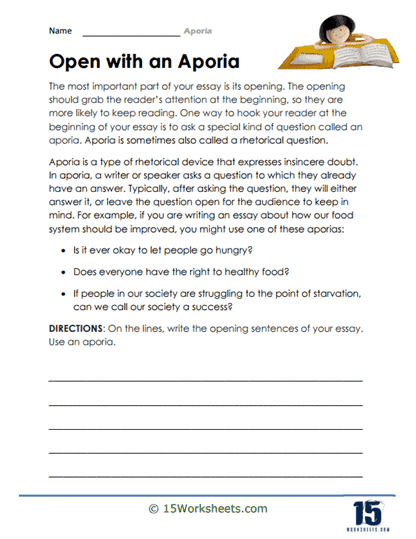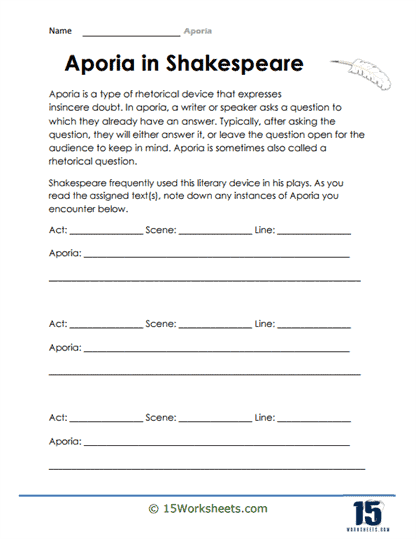Aporia Worksheets
All About These 15 Worksheets
Aporia, the rhetorical device that involves expressing doubt, perplexity, or uncertainty in order to stimulate critical thinking or create rhetorical tension, is a valuable tool in communication and argumentation. Understanding and mastering aporia not only enhances a student’s ability to engage in thoughtful discourse but also sharpens critical thinking, fosters persuasive skills, and encourages exploration of complex ideas.
In a world where effective communication, critical analysis, and nuanced understanding are essential, students must develop the ability to recognize, employ, and respond to aporia in their writing and speech. To empower students with the art of aporia and its multifaceted applications, we proudly present a collection of 15 worksheets on Aporia. These worksheets are meticulously designed to provide students with structured and engaging opportunities to explore, practice, and master the art of aporia.
What Is Aporia?
So first, let’s talk about what aporia means. Aporia is when a speaker or writer acts like they’re in doubt or they’re asking a question, not because they don’t know the answer, but because they want to make their audience think or emphasize a point. For example, a character in a book might say, “How could I possibly finish all this homework in one night?” when they’re trying to show they have way too much homework.
Now, imagine these worksheets as your training manual to become a pro at using this technique. They guide you to understand, identify, and even create your own examples of aporia. It’s like practicing a new trick in a video game until you get it just right.
There are many different types of worksheets available here. The first one might have sentences with aporia in them, and your job is to spot and underline the parts where the speaker is acting unsure or asking a question to make a point. This is like a hidden object game, but with words instead of pictures.
The second part could give you a situation, and your task is to come up with a sentence using aporia. For instance, if the situation is “You’re given an impossibly large ice cream sundae to eat,” you might write, “How could anyone eat all of this?”
The third section might challenge you to create your own examples of aporia from scratch. Maybe you’re trying to express how incredible it would be to visit a different planet. You could say, “Could anything be more exciting than setting foot on Mars?”
You will also find these worksheets turn into a fun game. They might have word puzzles or scenarios where you write a dialogue using aporia. You get to pretend you’re a character in a book or movie, using aporia to make your points more dramatic!
Practicing with these worksheets helps you become a more engaging and persuasive speaker and writer. It’s like learning a new strategy in a game that makes you more likely to win. You’ll be able to make your points stand out and make people think more about what you’re saying.
Why Do Authors Use This Technique In Their Work?
Authors use the literary device of aporia in their work for many reasons. Here’s why:
To Engage Readers – Aporia is a way of directly involving the readers in the narrative. When a character expresses doubt or asks a question, it can engage the readers’ minds, encouraging them to think about potential answers or solutions.
To Highlight Uncertainty – Authors often use aporia to highlight the uncertainties and complexities of life. It can show that a character, like real people, doesn’t have all the answers and is trying to make sense of the world.
To Develop Characters – Aporia can provide insight into a character’s thoughts and feelings. A character who often uses aporia might be seen as thoughtful, philosophical, or struggling with a problem.
To Create Drama and Suspense – Aporia can also be used to create a sense of drama or suspense. When a character expresses doubt or uncertainty about what’s going to happen next, it can make the readers feel eager to know how things will turn out.
To Enhance Rhetoric – In persuasive writing or speeches, authors may use aporia to make a point more effectively. By pretending to be in doubt or asking a question, they can draw attention to a particular issue or argument.
To Invite Reflection – By posing questions or expressing doubts, aporia invites readers to reflect on certain ideas or themes in the text. It opens up a space for readers to think and form their own interpretations.
To Indicate a Change in Direction – Sometimes, authors use aporia to indicate a change in the direction of their argument or narrative. The doubt or question acts as a kind of pivot point, leading the text in a new direction.
The Importance of Understanding Aporia For Students
Understanding aporia and its various forms is of great importance for several reasons:
- Critical Thinking: Aporia prompts students to think critically by encouraging them to question assumptions, explore complexities, and consider alternative viewpoints.
- Effective Communication: Proficiency in employing aporia enhances students’ ability to construct persuasive arguments, engage in meaningful discourse, and address counterarguments effectively.
- Nuanced Understanding: Aporia allows students to delve deeper into complex issues, encouraging them to consider multiple perspectives and engage with challenging ideas.
- Rhetorical Awareness: Recognizing aporia in speeches, essays, and discussions equips students with the skills to analyze the rhetorical strategies used by speakers and writers.
This collection of Aporia worksheets is a valuable resource for educators and parents committed to nurturing critical thinking, effective communication, and persuasive skills in students. Proficiency in recognizing, creating, and responding to aporia equips individuals with the tools to engage with complex issues, construct persuasive arguments, and appreciate the artistry of rhetoric in communication. This collection is an investment in their future success, ensuring they have the skills to navigate the rhetorical maze of uncertainty and engage with nuance and depth in discourse.
Embrace these Aporia worksheets today, and watch your students become adept communicators who can skillfully employ aporia to stimulate thought, foster understanding, and construct persuasive arguments in a complex world.





